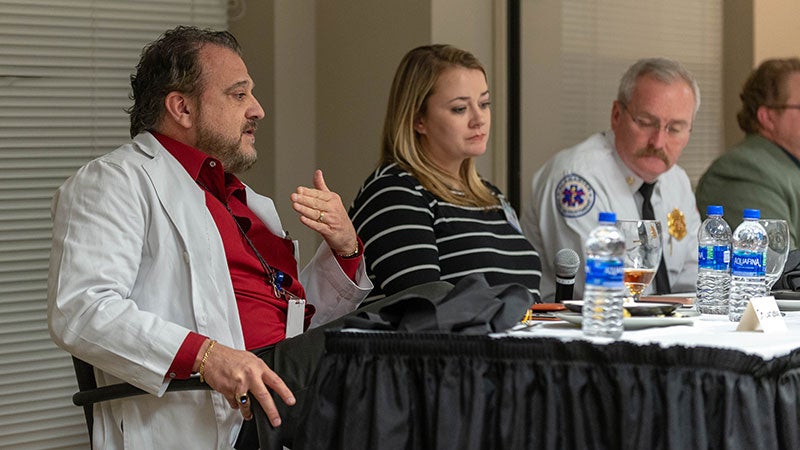Roundtable seeks to combat opioid epidemic
Published 10:51 am Wednesday, December 5, 2018

- Dr. Paul Larussa with Alabama Psychiatry, left, speaks during an opioid roundtable event at Shelby Baptist Medical Center on the night of Nov. 5 as fellow panel members Rachel Lawley with Bradford Health Services and Alabaster Fire Chief Tim Love look on. (Reporter Photo/Neal Wagner)
By NEAL WAGNER / Managing Editor
ALABASTER – John Bell still remembers the pain and guilt he felt while struggling with an ever-increasing addiction to opioid painkillers and eventually heroin.
“Addiction put me in a situation where I’d say ‘I’ll never do that,’ and then I’d find myself doing it,” Bell said as he shared his story to a group gathered for an opioid roundtable at Shelby Baptist Medical Center on Dec. 4. “The truth is, I couldn’t stop. I couldn’t stand the pain, physically and emotionally.
“You don’t have to look a certain way or be from a certain neighborhood to be an addict,” added Bell, who now works with Bradford Health Services and is helping others to overcome addictions. “And it’s important to remember that any addict can recover. There is no such thing as a hopeless case.”
Dozens gathered at the hospital for the roundtable, which brought together several experts to discuss the growing opioid epidemic, the effects it’s having in Shelby County and steps being taken to address it.
The panel included Alabaster Mayor Marty Handlon, William Lee Lockhart with Chilton Shelby Mental Health, Dr. Paul Larussa with Alabama Psychiatry, Alabaster Fire Chief Tim Love, Shelby County Probate Judge Allison Boyd and Rachel Lawley with Bradford Health Services. Lemeshia Chambers moderated the two-hour event.
“We are just scraping the surface here tonight,” Chambers said. “We don’t have to save the world, we’ve just got to save Shelby County, and you are where it starts. Once we do that, the world will look at what Shelby County is doing.”
Handlon and Love said the epidemic has hit Alabaster especially hard, with substance abuse and mental health issues contributing to a string of suicides in the city in 2017 and leading to a rising number of overdose calls for the Fire Department.
Since January, the AFD has responded to 37 calls requiring the use of Narcan, which is a substance used to reverse the effects of drug overdose.
“It has a real impact on us,” Love said. “It puts a stress on all emergency responders.”
Boyd said Shelby County’s Drug Court and Mental Health Court have seen significant increases in caseloads over the past few years, and outlined Drug Court procedures and involuntary commitment criteria.
Larussa said it’s hard for addicts to break the chain, because they become physically and emotionally dependent on the substances.
“Everything opiates do that makes people want to take them, you’re going to have to pay back,” Larussa said. “I tell people ‘You’re borrowing tomorrow’s happiness and tomorrow’s energy today when you take opiates.’ Once their effects wear off, your mood crashes, you hurt, your energy is non-existent. Sometimes that can lead to suicide.”
Mark McCulloch, also a recovering addict, encouraged those with loved ones battling addiction to speak out and seek help for them.
“You don’t have to understand addiction to make a difference,” he said.
“Addiction is a relapsing disease, and there is a treatment if administered on a regular basis,” Lockhart added. “The only time you see failure in recovery is when you stop trying.”









